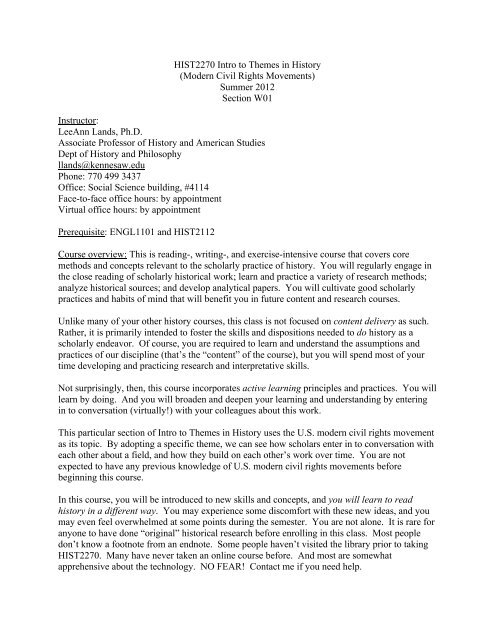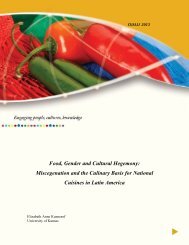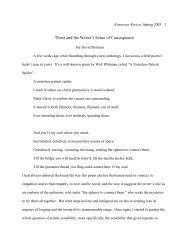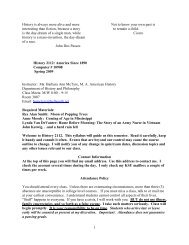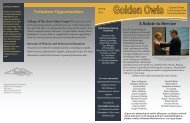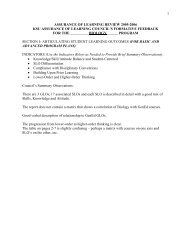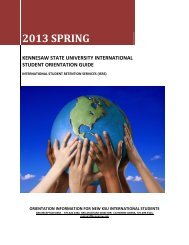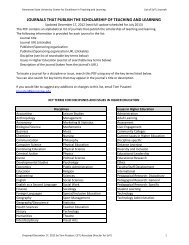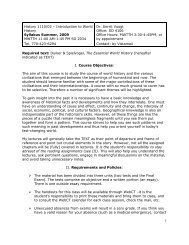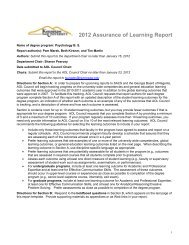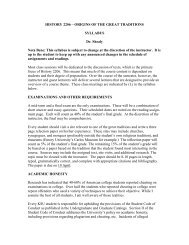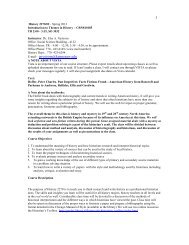HIST2270 Intro to Themes in History - Kennesaw State University
HIST2270 Intro to Themes in History - Kennesaw State University
HIST2270 Intro to Themes in History - Kennesaw State University
Create successful ePaper yourself
Turn your PDF publications into a flip-book with our unique Google optimized e-Paper software.
<strong>HIST2270</strong> <strong>Intro</strong> <strong>to</strong> <strong>Themes</strong> <strong>in</strong> His<strong>to</strong>ry<br />
(Modern Civil Rights Movements)<br />
Summer 2012<br />
Section W01<br />
Instruc<strong>to</strong>r:<br />
LeeAnn Lands, Ph.D.<br />
Associate Professor of His<strong>to</strong>ry and American Studies<br />
Dept of His<strong>to</strong>ry and Philosophy<br />
llands@kennesaw.edu<br />
Phone: 770 499 3437<br />
Office: Social Science build<strong>in</strong>g, #4114<br />
Face-<strong>to</strong>-face office hours: by appo<strong>in</strong>tment<br />
Virtual office hours: by appo<strong>in</strong>tment<br />
Prerequisite: ENGL1101 and HIST2112<br />
Course overview: This is read<strong>in</strong>g-, writ<strong>in</strong>g-, and exercise-<strong>in</strong>tensive course that covers core<br />
methods and concepts relevant <strong>to</strong> the scholarly practice of his<strong>to</strong>ry. You will regularly engage <strong>in</strong><br />
the close read<strong>in</strong>g of scholarly his<strong>to</strong>rical work; learn and practice a variety of research methods;<br />
analyze his<strong>to</strong>rical sources; and develop analytical papers. You will cultivate good scholarly<br />
practices and habits of m<strong>in</strong>d that will benefit you <strong>in</strong> future content and research courses.<br />
Unlike many of your other his<strong>to</strong>ry courses, this class is not focused on content delivery as such.<br />
Rather, it is primarily <strong>in</strong>tended <strong>to</strong> foster the skills and dispositions needed <strong>to</strong> do his<strong>to</strong>ry as a<br />
scholarly endeavor. Of course, you are required <strong>to</strong> learn and understand the assumptions and<br />
practices of our discipl<strong>in</strong>e (that’s the “content” of the course), but you will spend most of your<br />
time develop<strong>in</strong>g and practic<strong>in</strong>g research and <strong>in</strong>terpretative skills.<br />
Not surpris<strong>in</strong>gly, then, this course <strong>in</strong>corporates active learn<strong>in</strong>g pr<strong>in</strong>ciples and practices. You will<br />
learn by do<strong>in</strong>g. And you will broaden and deepen your learn<strong>in</strong>g and understand<strong>in</strong>g by enter<strong>in</strong>g<br />
<strong>in</strong> <strong>to</strong> conversation (virtually!) with your colleagues about this work.<br />
This particular section of <strong>Intro</strong> <strong>to</strong> <strong>Themes</strong> <strong>in</strong> His<strong>to</strong>ry uses the U.S. modern civil rights movement<br />
as its <strong>to</strong>pic. By adopt<strong>in</strong>g a specific theme, we can see how scholars enter <strong>in</strong> <strong>to</strong> conversation with<br />
each other about a field, and how they build on each other’s work over time. You are not<br />
expected <strong>to</strong> have any previous knowledge of U.S. modern civil rights movements before<br />
beg<strong>in</strong>n<strong>in</strong>g this course.<br />
In this course, you will be <strong>in</strong>troduced <strong>to</strong> new skills and concepts, and you will learn <strong>to</strong> read<br />
his<strong>to</strong>ry <strong>in</strong> a different way. You may experience some discomfort with these new ideas, and you<br />
may even feel overwhelmed at some po<strong>in</strong>ts dur<strong>in</strong>g the semester. You are not alone. It is rare for<br />
anyone <strong>to</strong> have done “orig<strong>in</strong>al” his<strong>to</strong>rical research before enroll<strong>in</strong>g <strong>in</strong> this class. Most people<br />
don’t know a footnote from an endnote. Some people haven’t visited the library prior <strong>to</strong> tak<strong>in</strong>g<br />
<strong>HIST2270</strong>. Many have never taken an onl<strong>in</strong>e course before. And most are somewhat<br />
apprehensive about the technology. NO FEAR! Contact me if you need help.
COURSE GOALS:<br />
At the conclusion of this course students will be able <strong>to</strong>:<br />
• describe and apply common discipl<strong>in</strong>ary practices/assumptions <strong>in</strong> his<strong>to</strong>rical research and<br />
<strong>in</strong>terpretation (e.g., attention <strong>to</strong> time and place, use of objective practices, recognition that<br />
scholars <strong>in</strong>terpret and that “his<strong>to</strong>ry changes”)<br />
• def<strong>in</strong>e and dist<strong>in</strong>guish between the major forms of scholarly his<strong>to</strong>rical writ<strong>in</strong>g (e.g.,<br />
reviews, journal articles, his<strong>to</strong>riographical essays)<br />
• describe the major library resources available <strong>to</strong> his<strong>to</strong>rians and apply them <strong>in</strong> the<br />
appropriate contexts<br />
• identify, differentiate between, and use <strong>in</strong>dexes/databases <strong>to</strong> respond <strong>to</strong> particular<br />
his<strong>to</strong>rical research questions<br />
• locate secondary sources and book reviews<br />
• describe practices of and <strong>to</strong>ols used <strong>in</strong> archival reposi<strong>to</strong>ries<br />
• describe and demonstrate ways <strong>in</strong> which his<strong>to</strong>rians enter <strong>in</strong> <strong>to</strong> scholarly conversations<br />
• identify and demonstrate ethical practices commonly adopted <strong>in</strong> the field<br />
• assemble analytical essays and annotated bibliographies us<strong>in</strong>g the practices common <strong>to</strong><br />
the field<br />
• assemble an his<strong>to</strong>rical argument based on primary sources<br />
• plan a substantial his<strong>to</strong>rical research project that utilizes primary and secondary sources<br />
Delivery of the course: This is an onl<strong>in</strong>e course delivered through GeorgiaVIEW Vista<br />
(http://vista.kennesaw.edu). You are required <strong>to</strong> check our Vista site daily.<br />
Technology requirements: You must have regular access <strong>to</strong> high speed <strong>in</strong>ternet, a web browser<br />
(with java, flash, and other components needed for audio/video delivery), and word process<strong>in</strong>g<br />
software. If you do not have access <strong>to</strong> this technology at home, I recommend that you use the<br />
university computer labs.<br />
Here are the technology resources KSU recommends for onl<strong>in</strong>e course participation:<br />
http://www.iddresources.org/qm/Guidel<strong>in</strong>esAndExpectations.html<br />
If you have any problems with technology, <strong>in</strong>clud<strong>in</strong>g GeorgiaVIEW Vista, contact IT Services<br />
(its.kennesaw.edu/students or 7704993555).<br />
Texts available for purchase at the KSU books<strong>to</strong>re and through various onl<strong>in</strong>e retailers:<br />
Brundage, Anthony. Go<strong>in</strong>g <strong>to</strong> the Sources: A Guide <strong>to</strong> His<strong>to</strong>rical Research and Writ<strong>in</strong>g. 4 th<br />
edition. Wheel<strong>in</strong>g, IL: Harlan Davidson, 2008.<br />
Graff, Gerald. They Say, I Say, With Read<strong>in</strong>gs. New York: W.W. Nor<strong>to</strong>n, 2009.<br />
Presnell, Jenny L. The Information-Literate His<strong>to</strong>rian: A Guide <strong>to</strong> Research for His<strong>to</strong>ry<br />
Students. New York: Oxford <strong>University</strong> Press, 2007.<br />
Other read<strong>in</strong>gs are available from the library databases.<br />
Other purchases:<br />
2
HEADPHONES. Headphones will help tremendously when you’re watch<strong>in</strong>g and listen<strong>in</strong>g <strong>to</strong> the<br />
video tu<strong>to</strong>rials.<br />
COURSE ORGANIZATION AND POLICIES<br />
Organization of course: This course is organized <strong>in</strong><strong>to</strong> modules. There is one module for every<br />
week <strong>in</strong> the course. Each module <strong>in</strong>cludes a number of different activities, such as a read<strong>in</strong>g, an<br />
exercise, a practice quiz, participation on the discussion board, or a “real” test. You can f<strong>in</strong>d the<br />
modules on GeorgiaVIEW Vista.<br />
Our module “weeks” beg<strong>in</strong> and end on Tuesdays at 5 p.m.. Because this is a summer course,<br />
there are EIGHT modules <strong>in</strong>stead of 15 modules.<br />
You are expected <strong>to</strong> complete the week’s module by the end of the week <strong>in</strong> which it is assigned,<br />
and I will frequently prevent participation <strong>in</strong> some course components after the due date has<br />
passed. I will not post the modules more than one week <strong>in</strong> advance. This means you won’t be<br />
able <strong>to</strong> work very far ahead <strong>in</strong> this course. Some modules require <strong>in</strong>teraction with other students<br />
(onl<strong>in</strong>e), so it’s imperative that you keep up with the week-<strong>to</strong>-week activities.<br />
The dates/times for module and assignment completion are given <strong>in</strong> the CALENDAR (which is<br />
posted on the Vista homepage as a .doc file).<br />
As <strong>in</strong> traditional face-<strong>to</strong>-face, three credit hour SUMMER courses, you will be expected <strong>to</strong> spend<br />
approximately SIX hours onl<strong>in</strong>e each week for formal course delivery, and then an additional 6<br />
<strong>to</strong> 12 hours <strong>in</strong> work outside class. In our case, you will spend additional time each week on your<br />
own complet<strong>in</strong>g labs, read<strong>in</strong>g, and other assignments related <strong>to</strong> the course. In sum, for an 8<br />
week (summer) semester, you should expect <strong>to</strong> commit 12 <strong>to</strong> 18 hours per week on this course. I<br />
have made every attempt <strong>to</strong> spread the work evenly across the semester.<br />
Communicat<strong>in</strong>g with me: I am easily accessible through regular email and GeorgiaVIEW Vista.<br />
(I can respond more quickly through regular email [llands@kennesaw.edu].) I will make every<br />
attempt <strong>to</strong> respond <strong>to</strong> you with<strong>in</strong> 24 hours (M-F). If I leave <strong>to</strong>wn for a conference or otherwise<br />
expect <strong>to</strong> be away from communication devices for an extended period of time, I will let you<br />
know beforehand.<br />
Ack! I’m hav<strong>in</strong>g trouble with this course! If you are struggl<strong>in</strong>g with the material, activities, or<br />
major assignments <strong>in</strong> this course, contact me as soon as possible. Also, I am on campus<br />
regularly and am glad <strong>to</strong> discuss the course and your progress face-<strong>to</strong>-face.<br />
Academic Honesty: No student shall receive, attempt <strong>to</strong> receive, know<strong>in</strong>gly give or attempt <strong>to</strong><br />
give unauthorized assistance <strong>in</strong> the preparation of any work required <strong>to</strong> be submitted for credit<br />
(<strong>in</strong>clud<strong>in</strong>g exam<strong>in</strong>ations, labora<strong>to</strong>ry reports, essays, themes, term papers, etc.). Unless<br />
specifically authorized, the presence and/or use of electronic devices dur<strong>in</strong>g an exam<strong>in</strong>ation,<br />
quiz, or other class assignment is considered cheat<strong>in</strong>g. Engag<strong>in</strong>g <strong>in</strong> any behavior that a professor<br />
prohibits as academic misconduct <strong>in</strong> the syllabus or <strong>in</strong> class discussion is cheat<strong>in</strong>g. When direct<br />
3
quotations are used, they should be <strong>in</strong>dicated, and when the ideas, theories, data, figures, graphs,<br />
programs, electronic based <strong>in</strong>formation or illustrations of someone other than the student are<br />
<strong>in</strong>corporated <strong>in</strong><strong>to</strong> a paper or used <strong>in</strong> a project, they should be duly acknowledged. No student<br />
may submit the same, or substantially the same, paper or other assignment for credit <strong>in</strong> more than<br />
one class without the prior permission of the current professor(s).<br />
All cases of academic misconduct are reported <strong>to</strong> the Department of Student Conduct and<br />
Academic Integrity.<br />
Learn<strong>in</strong>g Support Services: If you have a specific physical, psychiatric, or learn<strong>in</strong>g disability<br />
and require accommodations, please let me know early <strong>in</strong> the semester so that your learn<strong>in</strong>g<br />
needs may be appropriately met. You will need <strong>to</strong> provide documentation of your disability <strong>to</strong><br />
the disAbled Student Support Services office, located <strong>in</strong> the Student Center room 267, and obta<strong>in</strong><br />
a list of approved accommodations. More <strong>in</strong>formation is available at<br />
http://www.kennesaw.edu/stu_dev/dsss/dsss.html.<br />
4
MODULE LEARNING ACTIVITIES<br />
Each module <strong>in</strong>cludes a number of different activities, such as a read<strong>in</strong>g, a wiki exercise, a<br />
practice quiz, participation on the discussion board, or a “real quiz.”<br />
UNGRADED ACTIVITIES: A number of module activities are designed <strong>to</strong> help you develop<br />
skills <strong>in</strong>crementally, or broaden and deepen your knowledge through application of concepts and<br />
peer review of each other’s work. While you are not graded on these activities as such, you are<br />
required <strong>to</strong> participate <strong>in</strong> these activities and complete these exercises. I also encourage you <strong>to</strong><br />
test your knowledge by post<strong>in</strong>g practice quizzes that you can take without penalty <strong>to</strong> your grade.<br />
Participation policy:<br />
You are required <strong>to</strong> be prepared for and participate <strong>in</strong> all onl<strong>in</strong>e activities. Your f<strong>in</strong>al<br />
grade will be penalized up <strong>to</strong> 2 percentage po<strong>in</strong>ts for each class or module <strong>in</strong> which you<br />
fail <strong>to</strong> participate <strong>in</strong> module activities <strong>in</strong> a substantive way.<br />
I do not differentiate between excused and unexcused participation. If you know you will<br />
have <strong>to</strong> miss module activities for some reason (e.g., planned surgery), be aware that your<br />
f<strong>in</strong>al grade will be penalized accord<strong>in</strong>g <strong>to</strong> the participation policy. By substantive way I<br />
mean that you should respond thoughtfully <strong>to</strong> questions and <strong>in</strong> a way that demonstrates<br />
that you have completed read<strong>in</strong>gs, module tu<strong>to</strong>rials and/or other assigned activities.<br />
Markers of substantive participation: If there’s a practice quiz available, you’ve taken it.<br />
If there’s a wiki exercise, you’ve submitted a thoughtful response that <strong>in</strong>dicates that you<br />
followed the directions and completed any required tasks. If there’s a peer-review<br />
exercise, you’ve offered substantive responses <strong>to</strong> your colleague’s work and<br />
demonstrated knowledge and understand<strong>in</strong>g of material covered <strong>in</strong> the course. You don’t<br />
always have <strong>to</strong> be correct <strong>in</strong> your responses <strong>to</strong> practice quizzes and module exercises!<br />
Rather, these <strong>in</strong>teractions and exercises allow you and me <strong>to</strong> identify areas of competency<br />
and areas <strong>in</strong> need of more class discussion or <strong>in</strong>dividual assistance.<br />
Markers of <strong>in</strong>sufficient or poor participation: You’ve made no attempt at a practice quiz.<br />
You have not participated <strong>in</strong> exercises at all, or have responded <strong>in</strong> a way that <strong>in</strong>dicates<br />
that you did not complete the required read<strong>in</strong>gs, tu<strong>to</strong>rials, or other material. In peerreview<br />
exercises, you failed <strong>to</strong> comment as required, or you made cursory, <strong>in</strong>complete<br />
remarks.<br />
I frequently respond <strong>to</strong> module activities such as wiki post<strong>in</strong>gs dur<strong>in</strong>g the module week <strong>in</strong> which<br />
activities are assigned. Feedback directly <strong>in</strong> <strong>to</strong> the wiki environment gives you a chance <strong>to</strong> see<br />
what I expect regard<strong>in</strong>g content and clarity. Check back on the wiki site frequently <strong>to</strong> see how I<br />
am respond<strong>in</strong>g <strong>to</strong> yours and others’ work.<br />
I make a practice of not<strong>in</strong>g module activity with<strong>in</strong> the Vista gradebook by <strong>in</strong>dica<strong>to</strong>rs such as<br />
“good work!” or “revisit chapter 2 before the test!” I also use the gradebook and email <strong>to</strong><br />
encourage improvement or reconsideration of some wiki responses.<br />
5
TESTS. There will be four tests on the skills and concepts covered <strong>in</strong> read<strong>in</strong>gs, lectures,<br />
assignments, and other activities. All tests and assignments are cumulative. That is, you are<br />
expected <strong>to</strong> reta<strong>in</strong> and use all material delivered throughout the course. The tests will be<br />
completed onl<strong>in</strong>e and are only available dur<strong>in</strong>g the module week <strong>in</strong> which they are given. Test<br />
dates are shown <strong>in</strong> the calendar that is posted as a .doc file on Vista. You cannot take tests after<br />
the module week <strong>in</strong> which they are given, and there are no make-up tests.<br />
MAJOR ASSIGNMENTS. You will complete a variety of “major” assignments <strong>in</strong> which you<br />
are required <strong>to</strong> locate, read and analyze primary and secondary resources. Some major<br />
assignments will require you <strong>to</strong> compile your f<strong>in</strong>d<strong>in</strong>gs and analysis <strong>in</strong> three <strong>to</strong> five page papers.<br />
These assignments will help you practice your research, analytical, and writ<strong>in</strong>g skills as you ga<strong>in</strong><br />
a broader, deeper and more mean<strong>in</strong>gful understand<strong>in</strong>g of the practice of his<strong>to</strong>rical research,<br />
analysis, and writ<strong>in</strong>g. All tests and major assignments are cumulative. That is, you are expected<br />
<strong>to</strong> reta<strong>in</strong> and apply all skills and knowledge acquired throughout the balance of the semester.<br />
Major assignments are due at the day and time specified <strong>in</strong> the course modules. (The dates are<br />
also shown on the calendar that is posted as a .doc file on Vista.) You will be penalized 10<br />
percentage po<strong>in</strong>ts for each 24 hour period that an assignment is late. The “late clock” starts at<br />
the assignment due date and time. That is, if a major assignment is due at 5:00 p.m., you will<br />
lose 10 percentage po<strong>in</strong>ts if you submit the assignment at 5:05 p.m..<br />
Details of each major assignment will be provided <strong>in</strong> the modules on Vista, but here’s a brief<br />
overview of each:<br />
Lab1, Lab2, Lab3: The labs are step by step guides and worksheets that <strong>in</strong>troduce you <strong>to</strong> library<br />
databases and hardcopy <strong>in</strong>dices that help you locate primary and secondary resources on a <strong>to</strong>pic<br />
of <strong>in</strong>terest. Students usually f<strong>in</strong>d these exercises <strong>to</strong> be some of the most valuable <strong>in</strong> the course.<br />
You will f<strong>in</strong>d the <strong>to</strong>ols and skills useful for complet<strong>in</strong>g your research papers, senior sem<strong>in</strong>ar<br />
paper, or for design<strong>in</strong>g curricula and exhibits.<br />
AB: Here you will develop a short thematic annotated bibliography based on scholarly secondary<br />
journal articles or books. A grad<strong>in</strong>g rubric is <strong>in</strong>cluded <strong>in</strong> the assignment directions.<br />
AE: This is a short analytical paper derived from primary resources that I will provide <strong>to</strong> you. A<br />
grad<strong>in</strong>g rubric is <strong>in</strong>cluded <strong>in</strong> the assignment directions.<br />
RP: In RP you will use the library research skills you learned earlier <strong>in</strong> the semester <strong>to</strong> plan (not<br />
implement!) a larger research project based on your AE. In other words, you are develop<strong>in</strong>g a<br />
“research plan” for expand<strong>in</strong>g your AE. A grad<strong>in</strong>g rubric is <strong>in</strong>cluded <strong>in</strong> the assignment<br />
directions.<br />
Late policy on major assignments: Major assignments are due at the day and time specified <strong>in</strong><br />
the course modules and on the calendar posted <strong>in</strong> Vista. You will be penalized 10 percentage<br />
po<strong>in</strong>ts for each 24 hour period that an assignment is late. The “late clock” starts at the<br />
assignment due date and time. That is, if a major assignment is due at 5:00 p.m., you will lose 10<br />
percentage po<strong>in</strong>ts if you submit the assignment at 5:05 p.m..<br />
6
GRADES:<br />
TEST1 10<br />
TEST2 10<br />
TEST3 10<br />
TEST4 10<br />
Lab1 10<br />
Lab2 10<br />
Lab3 10<br />
AB 10<br />
AE 10<br />
RP 10<br />
TOTAL 100%<br />
Grade scale (%):<br />
A=90-100, B=80-89, C=70-79, D=60-69, F=0-59<br />
I will do my best <strong>to</strong> post major assignment grades with<strong>in</strong> one weeks of an assignment due date. I<br />
will provide you with feedback with<strong>in</strong> the Vista gradebook, by return<strong>in</strong>g a marked-up<br />
assignment, by distribut<strong>in</strong>g a “key”, or by post<strong>in</strong>g a video discussion of the test/assignment.<br />
7
DATE<br />
Wednesday<br />
5/30/2012<br />
Classes<br />
beg<strong>in</strong>!<br />
5 p.m.,<br />
Tuesday<br />
6/5/2012<br />
HAVE COMPLETED<br />
This is the module for which you<br />
should have completed all<br />
activities by the day and time<br />
shown <strong>in</strong> the left-most column.<br />
Any quizzes, tests or exercises from<br />
Module 1<br />
DUE<br />
These are the MAJOR<br />
ASSIGNMENTS that<br />
are due at the date and<br />
time shown <strong>in</strong> the leftmost<br />
column.<br />
START<br />
This is what you will start on the<br />
date and time shown <strong>in</strong> the leftmost<br />
column.<br />
Module 1 Part 1:Are you ready for<br />
onl<strong>in</strong>e learn<strong>in</strong>g? Log <strong>in</strong> <strong>to</strong><br />
vista.kennesaw.edu <strong>to</strong> beg<strong>in</strong>!<br />
Module 1 Part 2 Th<strong>in</strong>k<strong>in</strong>g like a<br />
his<strong>to</strong>rian<br />
Module 2 Part 1 The structure of<br />
scholarly secondary articles;<br />
arguments and objective practices<br />
Module 2 Part 2 Locat<strong>in</strong>g<br />
Secondary sources<br />
LAB1 and LAB2 will be<br />
distributed <strong>in</strong> this module.<br />
READINGS<br />
This is the assigned read<strong>in</strong>g for the<br />
week’s module. The read<strong>in</strong>gs are<br />
also given with<strong>in</strong> the module<br />
<strong>in</strong>structions on Vista.<br />
Dur<strong>in</strong>g module 1, read: Brundage, Ch.<br />
1; Presnell, Ch. 1; Graff sections 1 and<br />
2 (that is, chapters 1 through 7).<br />
Dur<strong>in</strong>g module 2, read Berg, Manfred.<br />
"Black Civil Rights and Liberal<br />
Anticommunism: The NAACP <strong>in</strong> the<br />
Early Cold War." _Journal of American<br />
His<strong>to</strong>ry_ 94 (June 2007): 75-96.<br />
Dur<strong>in</strong>g module 2, read: Graff sections 3<br />
and 4 (that is, chapters 8 through 14 –<br />
<strong>in</strong>clud<strong>in</strong>g that science chapter!!);<br />
Brundage, Ch 2 through 4; Presnell Ch.<br />
2 through 4.<br />
5 p.m.,<br />
Tuesday<br />
6/12/2012<br />
Any quizzes, tests or exercises from<br />
Module 2<br />
LAB1<br />
TEST1<br />
TEST1 will be part of this module.<br />
Module 3 Part 1 Cit<strong>in</strong>g Secondary<br />
sources<br />
Module 3 Part 2 Book reviews and<br />
His<strong>to</strong>riography<br />
Dur<strong>in</strong>g module 3, read: Korstad, Robert<br />
and Nelson Lichtenste<strong>in</strong>.<br />
“Opportunities Found and Lost: Labor,<br />
Radicals, and the Early Civil Rights<br />
Movement.” Journal of American<br />
His<strong>to</strong>ry 75 (December 1988): 786-811.<br />
Dur<strong>in</strong>g module 3, read: Brundage, Ch.<br />
5; read Hall, Jacquelyn Dowd. “The<br />
Long Civil Rights Movement and the<br />
Political Uses of the Past.” _Journal of<br />
American His<strong>to</strong>ry_ 91 (March 2005):<br />
1233-1263.
DATE<br />
5 p.m.,<br />
Tuesday<br />
6/19/2012<br />
HAVE COMPLETED<br />
This is the module for which you<br />
should have completed all<br />
activities by the day and time<br />
shown <strong>in</strong> the left-most column.<br />
Any quizzes, tests or exercises from<br />
Module 3<br />
DUE<br />
These are the MAJOR<br />
ASSIGNMENTS that<br />
are due at the date and<br />
time shown <strong>in</strong> the leftmost<br />
column.<br />
LAB2<br />
START<br />
This is what you will start on the<br />
date and time shown <strong>in</strong> the leftmost<br />
column.<br />
Module 4 Part 1 Ethics, Writ<strong>in</strong>g,<br />
and His<strong>to</strong>riography<br />
READINGS<br />
This is the assigned read<strong>in</strong>g for the<br />
week’s module. The read<strong>in</strong>gs are<br />
also given with<strong>in</strong> the module<br />
<strong>in</strong>structions on Vista.<br />
In module 4, read Joseph, Peniel E.<br />
“The Black Power Movement: A <strong>State</strong><br />
of the Field.” Journal of American<br />
His<strong>to</strong>ry 96 (December 2009): 751-76.<br />
Module 4 Part 2 Annotated<br />
bibliographies 1<br />
AB directions will be distributed<br />
<strong>in</strong> this module.<br />
5 p.m.,<br />
Tuesday<br />
6/26/2012<br />
TEST2 will be part of this module<br />
Any exercises from Module 4. TEST2 Module 5 Part 1 Annotated<br />
bibliographies 2; Primary Sources<br />
and Archives<br />
LAB3 will be distributed <strong>in</strong> this<br />
module.<br />
Dur<strong>in</strong>g module 5, read: Presnell Ch. 6<br />
<strong>to</strong> 9; Brundage Ch. 6<br />
AB<br />
Module 5 Part 2 Primary sources<br />
and the AE<br />
5 p.m.,<br />
Tuesday<br />
7/3/2012<br />
5 p.m.,<br />
Tuesday<br />
7/10/2012<br />
Any quizzes, tests or exercises from<br />
Module 5<br />
Any quizzes, tests or exercises from<br />
Module 6<br />
LAB3<br />
AE<br />
AE directions will be distributed <strong>in</strong><br />
this module<br />
Module 6 Part 1 Primary sources<br />
and the AE<br />
Module 6 Part 2 Cit<strong>in</strong>g Primary<br />
Sources and Outl<strong>in</strong><strong>in</strong>g AE<br />
Module 7 Part 1 AE, cont<strong>in</strong>ued<br />
2
DATE<br />
HAVE COMPLETED<br />
This is the module for which you<br />
should have completed all<br />
activities by the day and time<br />
shown <strong>in</strong> the left-most column.<br />
DUE<br />
These are the MAJOR<br />
ASSIGNMENTS that<br />
are due at the date and<br />
time shown <strong>in</strong> the leftmost<br />
column.<br />
START<br />
This is what you will start on the<br />
date and time shown <strong>in</strong> the leftmost<br />
column.<br />
Module 7 Part 2 Develop<strong>in</strong>g a<br />
research plan<br />
READINGS<br />
This is the assigned read<strong>in</strong>g for the<br />
week’s module. The read<strong>in</strong>gs are<br />
also given with<strong>in</strong> the module<br />
<strong>in</strong>structions on Vista.<br />
TEST3 will be part of this module<br />
5 p.m.,<br />
Tuesday<br />
7/17/2012<br />
5 p.m.,<br />
Tuesday<br />
7/24/2012<br />
5 p.m.,<br />
7/26 <strong>to</strong><br />
7/30<br />
Any quizzes, tests or exercises from<br />
Module 7<br />
Any quizzes, tests or exercises from<br />
Module 8<br />
RP<br />
TEST3<br />
TEST4 (i.e., THE FINAL<br />
EXAM)<br />
Module 8 Part 1 F<strong>in</strong>ish<strong>in</strong>g your RP<br />
3


